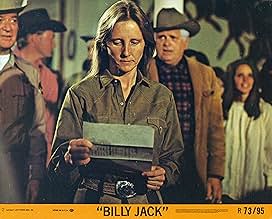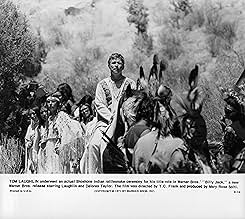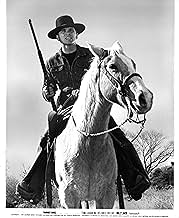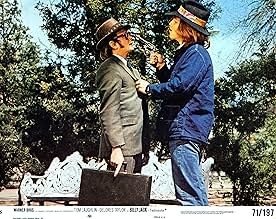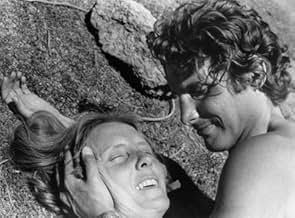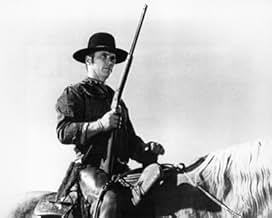Adicionar um enredo no seu idiomaEx-Green Beret hapkido expert saves wild horses from being slaughtered for dog food and helps protect a desert "freedom school" for runaway.Ex-Green Beret hapkido expert saves wild horses from being slaughtered for dog food and helps protect a desert "freedom school" for runaway.Ex-Green Beret hapkido expert saves wild horses from being slaughtered for dog food and helps protect a desert "freedom school" for runaway.
- Prêmios
- 1 vitória e 2 indicações no total
- O.K. Corrales
- (as Allan Meyerson)
- Direção
- Roteiristas
- Elenco e equipe completos
- Produção, bilheteria e muito mais no IMDbPro
Enredo
Você sabia?
- CuriosidadesTom Laughlin had no martial arts training before he started training for the movie. He studied under a master teacher for six months before filming started.
- Erros de gravaçãoMartin credits the Serenity Prayer to St. Francis of Assisi. It was actually written by American theologian Reinhold Niebuhr, and first published in the 1930s.
- Citações
[Billy Jack is surrounded by Posner's thugs]
Mr. Posner: You really think those Green Beret Karate tricks are gonna help you against all these boys?
Billy Jack: Well, it doesn't look to me like I really have any choice now, does it?
Mr. Posner: [laughing] That's right, you don't.
Billy Jack: You know what I think I'm gonna do then? Just for the hell of it?
Mr. Posner: Tell me.
Billy Jack: I'm gonna take this right foot, and I'm gonna whop you on that side of your face...
[points to Posner's right cheek]
Billy Jack: ...and you wanna know something? There's not a damn thing you're gonna be able to do about it.
Mr. Posner: Really?
Billy Jack: Really.
[kicks Posner's right cheek, sending him to the ground]
- Cenas durante ou pós-créditos"Directed by T.C. Frank" Tom Laughlin's pseudonym in honor of his children Teresa, Christina and Frank.
- ConexõesFeatured in Precious Images (1986)
- Trilhas sonorasOne Tin Soldier
Performed by Coven
Sung by Jinx Dawson of Coven
Written by Dennis Lambert and Brian Potter
The start of the film really has nothing to do with Billy Jack. It is a deputy in the town having his runaway teen daughter returned to him. She tells him she is pregnant and she has been with so many guys she doesn't even know the father's race. Dad explodes in anger and beats her. The deputy panics and dumps what may be her "body" for all he knows out in the wild. Billy Jack finds the girl and hides her at The Freedom School - a counterculture alternative school with mainly native students, but the school is open to any kid with problems.
So the rest of the movie is based on the deputy's lie that his daughter ran away again, that she is pregnant, and that a boy at the Freedom School is the father. And weirdly enough, deputy dad never recants this story, and seems to come to believe it himself.
Now things were never great between the counterculture pacifist school and the traditional townspeople, but the story of the deputy's daughter brings things to a boil.
And in the middle of all of this is Billy Jack, a half native American ex special forces vet who protects the school - as best as one guy can - with physical force when he has to, and plus he really seems to enjoy it too. And the film gives you two hissable villains, town political boss Posner and his bullying cowardly son Bernard, always retreating to the safety of dad's shadow when his misdeeds get him in bad with Billy Jack.
This film only cost 800K to make yet raked in 33 million with largely wooden acting, a script that meanders and often contradicts itself, and lots of on location shooting so that expensive sets were not needed. So why did people flock to this little indie in droves? Because if you want to understand the Vietnam era and counterculture movement of the late 60s/early 70s I would say watch this film rather than the more famous and acclaimed "All In the Family". The hypocritical and racist townsfolk - often to the point of being cartoonish - actually symbolize how the oldest crop of the boomers saw the establishment. Billy Jack really did symbolize a hero as he had to be, where Jean was a hero/heroine the way people would have liked to be. And it had much to say about the ugliness of racism practiced by everyday people.
For film history buffs, I would say this film is worthwhile. It also has many quotable quotes, and if you look carefully you'll see Howard Hesseman (Doctor Johnny Fever of WKRP in Cincinnati) in a very small and early role as a drama teacher at the school who shows up at a hearing about closing the school and recites a speech that he at first claims is by George Washington, and then reveals it was written by Adolph himself. Not that this speech had anything to do with what the hearing was about, and such is the disorganized symbol of an era that this film became.
- AlsExGal
- 27 de mar. de 2020
- Link permanente
Principais escolhas
Detalhes
- Data de lançamento
- País de origem
- Idioma
- Também conhecido como
- Billy, el defensor
- Locações de filme
- Empresas de produção
- Consulte mais créditos da empresa na IMDbPro
Bilheteria
- Orçamento
- US$ 800.000 (estimativa)
Contribua para esta página



